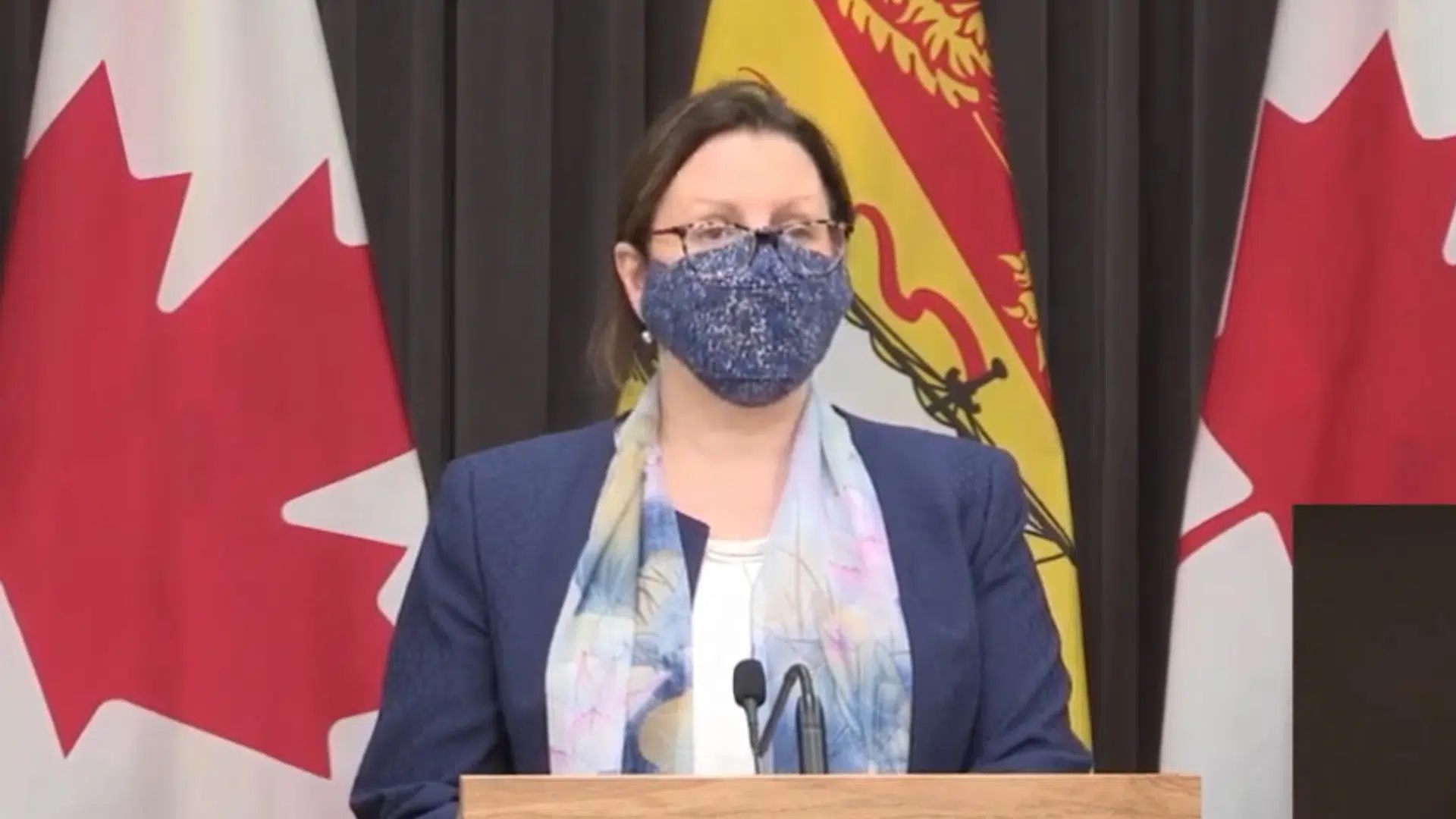
Dr. Jennifer Russell, the chief medical officer of health for New Brunswick, speaks on Feb. 11, 2021. (Image: GNB YouTube video capture)
New Brunswick reported two new Covid-19 cases and one additional death related to the virus on Thursday.
Chief medical health officer Dr. Jennifer Russell said the individual aged 80-to-89 years old died earlier in the day was a resident at Villa Des Jardins in Edmundston.
There have now been 22 deaths related to Covid-19 in New Brunswick since the first case was reported last March.
Meanwhile, Russell said there is one new case in the Moncton health region (Zone 1) and one case in the Edmundston health zone (Zone 4).
There are now 161 active cases in the province, a drop of 14 compared to Wednesday. Six people are currently in the hospital, including two in intensive care.
Thursday’s briefing included a presentation on the new Covid-19 variants by Dr. Gordon Dow, an infectious disease specialist with Horizon Health Network and member of the province’s pandemic task force.
Dow described the Covid-19 virus as “a thief that tries to break into your house and steal all the furniture” if the cell were a house and the machinery in it were the furniture. The new variants are due to mutations of the spike protein in the Covid-19 virus, making them between 30-to-80 percent more contagious, Dow said.
At the beginning of the pandemic, the reproduction rate of the virus was one, meaning each person infected with Covid-19 was infecting one other person every four days. But with the new variants, that reproduction rate increases. One infected person could infect two or more people, which would lead to “exponential spread,” Dow said.
He explained that a few weeks ago, the reproduction rate in the province was about 1.5 percent. That meant in one month, that led to 675 infections and five deaths. A virus that’s 50 perent more transmissible would boost that rate to 2.25, leading to 2,278 infections and 18 deaths in a month.
“[The new variants] rapidly replace older strains. They’re more fit. So they’ll replace the older strains that are in Canada right now usually in about a three-month period. They can infect people who have recovered from the older strain of Covid-19,” said Dow.
Some vaccines are less effective against some of the strains, and younger people are more vulnerable to these new variants, he said. How they impact children is still unclear, but because of the higher level of transmissibility, children are more likely to get infected.
Dow said the data on whether the new variants are more deadly is still “very poor.”
“At this time, there is no firm evidence that it’s more lethal,” he said. But Dow is more concerned about the fact that it’s more infectious.
“I’m more concerned about more transmissible because increased transmissibility means that it spreads exponentially, and exponential spread means that mortality will go up exponentially,” he said. “While if it’s just more lethal, the death rate will go up at a much lower rate.”
He also said that more people will have to be vaccinated to achieve herd immunity. Dow said it’s still unclear what herd immunity is for Covid-19, as it’s different for each virus. Measles, for instance, requires 90-to-95 percent of the population to be vaccinated.
“Herd immunity means that once you vaccinate a certain proportion of the population, just having that group vaccinated protects the others that aren’t vaccinated,” he said. “We don’t know what it is for Covid. We’ve been guessing that it’s around 70 percent.”
However, Dow said the good news is, Public Health measures work to keep the new strains at bay.
In orange level, he urged people to continue following Public Health guidelines, limit their social networks, not go to work or school if they’re symptomatic, get tested if they develop one or more symptoms, wear a mask, wash their hands, not touch their faces, cough into a tissue or their sleeves, and clean or disinfect household surfaces frequently.
Currently, New Brunswick has to send samples of tests suspected to have the new strain to the National Microbiology Lab in Winnipeg. That means, the turnaround time for tests of new variants is about a week, said Russell.
Public Health is currently exploring options to build New Brunswick’s own capacity to test those variants, but it’s not there yet right now.
Still, she said if a medical officer has a high suspicion that a case is of a new variant, even before the sample is sent, they will take extra precautions.
“They’re encouraging a 21-day self-isolation instead of a 14-day self-isolation and they’re trying to be very diligent and conscientious and probably a bit more aggressive with the contact tracing at this time,” she said.
Health Minister Dorothy Shephard said while the government wants to get the whole province back to the yellow alert level “as soon as possible” and bring back the Atlantic Bubble, “we must go about it the right way.”
“Health zones will need to remain in the orange level for at least two or three weeks, giving the province time to stabilize the number of Covid-19 cases before we can consider the possibility of moving to yellow,” she said. “The situation is still precarious and one wrong move could lead to an increase in cases. We are constantly analyzing the situation and we are working closely with Public Health.”
Public Health also looking into the yellow level guidelines to determine whether changes should be made to ensure health and safety.
Inda Intiar is a reporter for Huddle, an Acadia Broadcasting content partner.







